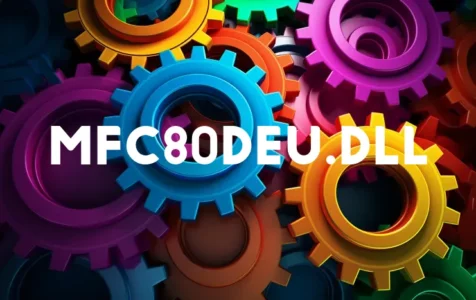Introduction to mfc80deu.dll
mfc80deu.dll is a dynamic link library (DLL) file associated with MicrosoftВ® Visual StudioВ® 2005 and is a part of the Microsoft Visual C++ 2005 Redistributable package. It provides MFC (Microsoft Foundation Class) Language Specific Resources, particularly for German language support. This DLL file contains program code, data, and resources used by multiple programs on a Windows operating system.
Is mfc80deu.dll Safe?
The original mfc80deu.dll file provided by Microsoft is safe to run on your system. However, you should be cautious as some malicious programs may disguise themselves as mfc80deu.dll. To ensure the DLL file is not a virus or malware, you can run an antivirus scan using reputable security software.
Common Issues Associated with mfc80deu.dll
Problems with mfc80deu.dll often occur when a software application requires the file, and it is missing or corrupted. The specific issues users might encounter include:
1. “mfc80deu.dll not found” or “mfc80deu.dll is missing” error messages.
2. Application crashes due to incompatibilities with updated versions of the DLL.
3. Programs failing to start or behaving erratically.
Expert Tip: For smoother PC performance, consider using a PC optimization tool. It handles junk files, incorrect settings, and harmful apps. Make sure it's right for your system, and always check the EULA and Privacy Policy.
Special offer. About Outbyte, uninstall instructions, EULA, Privacy Policy.
How to Fix Issues with mfc80deu.dll
To address issues related to mfc80deu.dll, you can follow these steps:
1. Reinstall the affected program: If a particular program is causing the issue, you might need to reinstall it to restore the missing DLL file.
2. Run a virus/malware scan: As mentioned, it’s important to ensure that the file is not a disguised piece of malware.
3. Install Windows Updates: Keeping your system up to date can help prevent and fix DLL-related issues.
4. Install the latest Microsoft Visual C++ Redistributables: Since mfc80deu.dll is part of the Visual C++ Redistributables, downloading and installing the latest package may resolve the problem.
5. Perform an SFC scan: The System File Checker (SFC.exe) can repair corrupted or missing system files, including DLLs.
To run an SFC scan, follow these steps:
– Press the Windows Key + X and select “Command Prompt (Admin)” or “Windows PowerShell (Admin)”.
– Type `sfc /scannow` and press Enter.
– Wait for the process to complete and then restart your computer if it repairs any files.
Manual Installation of mfc80deu.dll
If an SFC scan does not resolve the issue and you choose to download and install mfc80deu.dll manually, it is crucial to be cautious. Only download DLLs from reputable sources. Once you have the correct file:
– Place the DLL in the program’s installation directory or in the Windows default DLL directory (C:\Windows\System32 or C:\Windows\SysWOW64 for 64-bit systems).
– Register the DLL using the regsvr32 command: Open a Command Prompt with administrative privileges and type `regsvr32 mfc80deu.dll`, then press Enter.
User Experiences with mfc80deu.dll
When browsing community discussions about mfc80deu.dll, you will find varied experiences from users who have faced issues with the file. Some users have successfully resolved their problems by following the steps outlined above, while others have had to seek additional assistance. It is worthwhile to refer to recent discussions for up-to-date information, user-shared solutions, and community support.
Please note that it is not generally recommended to download dll files from external websites due to the risks of malware. Always try to resolve the issue using the built-in system tools or official channels first.
Conclusion
The mfc80deu.dll file plays a vital role in the smooth functioning of German language applications built with Microsoft Visual Studio 2005. If you encounter problems with this DLL, it usually can be resolved through routine troubleshooting steps, such as running system updates, performing system scans, or reinstalling the affected software. Always prioritize safety and verify the authenticity of the DLL file to protect your computer from security threats.
